With the vast array of eCommerce solutions available in today’s digital marketplace, it can be overwhelming trying to decide which platform is right for your business needs. That’s why we have developed a comprehensive guide to 10 leading open-source eCommerce platforms that offer free and flexible tools for building an online store from scratch or expanding on existing websites. From well-known options like Magento and PrestaShop to newer players like OpenCart, you’ll find information on user-friendly features, scalability capacity, and payment functions so you can make an educated decision!
The optimum utility of these online platforms has rendered it easier for anyone to start their open source eCommerce store. This effectively means that you no longer need to have extensive coding skills in order to get started with your online store. With that being said, a thorough background understanding of how these open source eCommerce platforms operate would definitely help you in profound ways.
The bottom line is that it is highly unlikely for you to find yourself lost in the technical enigmas to keep you from starting your online store.
Read on for more details about how these powerful yet affordable open source eCommerce platforms you can wield for creating and getting started with your eCommerce journey.
Top Trending Open Source ECommerce Platforms
1. WooCommerce:
If you are looking for a reliable and secure way to set up an ecommerce platform on your website or blog, then you should consider WooCommerce. As the world’s most popular open source ecommerce platform, WooCommerce makes setting up a hassle-free online store an easy task. With thousands of themes and plugins available, there is no limit to what types of businesses can benefit from the power of this dynamic system. It is for fair reasons why WooCommerce is widely considered one of the best open source ecommerce platforms available today owing to the ease it offers to make your online business venture successful!
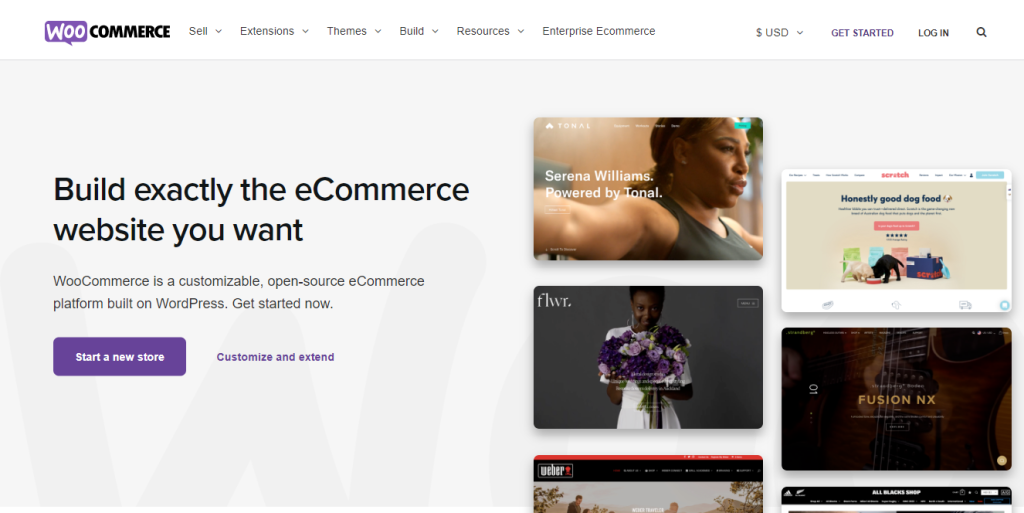
WooCommerce is basically an ecommerce plugin and can be integrated to the Content Management System or CMS of WordPress. Like all others, installation of WooCommerce WordPress plugin doesn’t require much efforts.
The reports and analytics of builtwith show that more than 30% of ecommerce business stores world wide are created with the help of WooCommerce. This statistic is enough to spotlight the popularity of WooCommerce in the capacity of open source ecommerce platform for online businesses.
Benefits of Using WooCommerce:
- Offers greater scalability
- Exclusive drag and drop feature
- User friendly
- Understanding of coding like HTML or CSS is not required at all
- Provision of wide array of free and premium themes at users’ dispense
- Provision of wide array of free and premium plugins at users’ dispense
Drawbacks of Using WooCommerce:
- As the store grows, so does the your reliability on technical assistance
- Lacks in providing local hosting services
Pricing:
Free
2. Magento
Magento is one of the most renowned open source ecommerce platforms that works equally good for both people and businesses. According to a report by builtwith, more than 8.4% of the leading 1 million ecommerce stores use Magento to create and manage their websites.
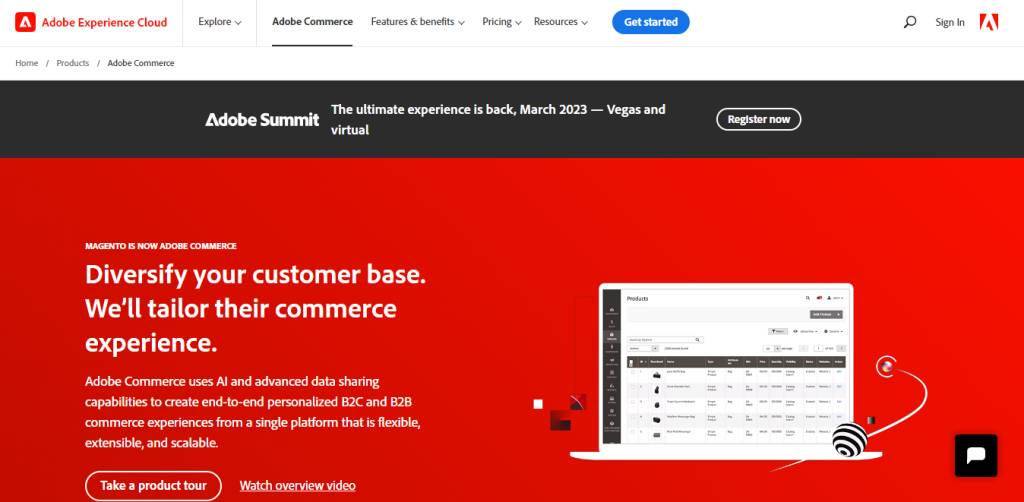
Magento Commerce changed their name quite recently in 2021 to Adobe Commerce however their open source ecommerce platforms are still referred to as Magento.
Like few other leading open source ecommerce platforms, Magento also works on the PHP model in order to create and scale your online ecommerce store.
Magento comes with a provision of numerous extensions that enable quick integration of your business with certain third party applications that are conducive to increasing the ROI.
Since Magento is founded on PHP, it can get a little tricky to use. Initially, you may also require expertise of a Mangento professional developer to get started with your store. Nonetheless, you can still take charge of managing your website with a little hands on learning of PHP to your advantage.
Benefits of Using Magento:
- Offers customization and personalization
- Trusted scalability
- Ranks your ecommerce platform by using SEO tools and techniques
Drawbacks of using Magento:
- Higher capital cost
- Can get a little trickier to launch the ecommerce store owing to technical delicacies
- Requires technical assistance for enhanced scalability
Pricing:
Magento open source is accessible for free. However, you can get Adobe’s quotation on request.
3. Drupal
Drupal is yet another one of the leading open source ecommerce platforms. According to builtwith, an estimated of more than 500,000 websites have already been created using Drupal commerce.
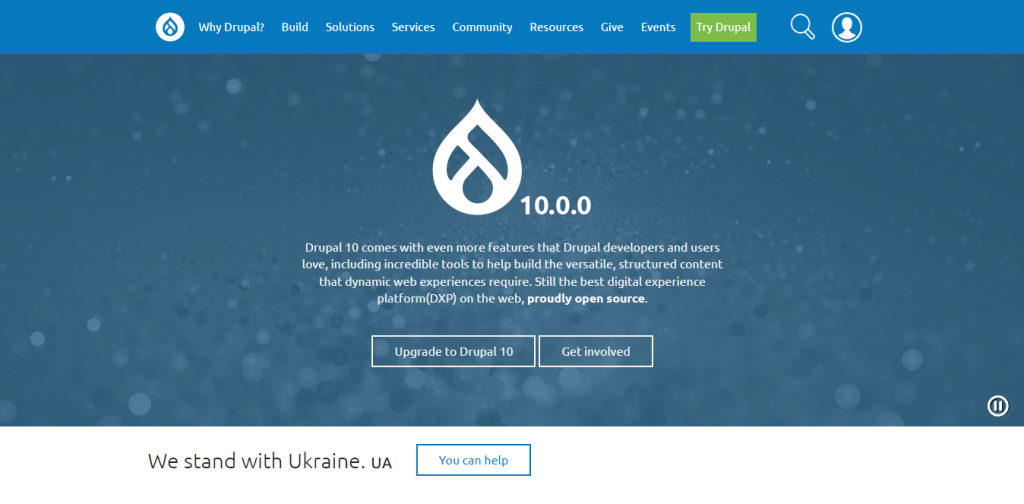
Drupal makes its standing among the other open source ecommerce platforms owing to its remarkable organization and tracking of orders, receipts payment vouchers, and invoicing. Moreover, it also supports several integrations for the seamless working of its shipments and payment plans.
Since the recent updates of Google algorithms encourage dedicated CMS for ecommerce platforms, Drupal has a very well structured Content Management System that provides complete management and administrative accessibility of operating your store. This includes but is not limited to different opt-in forms and UI content management.
Benefits of Using Drupal:
- Supports third party applications for integration
- Fosters an online community to offer quick troubleshooting of common ecommerce issues
- Ranks your ecommerce platform by using SEO tools and techniques for better positioned SERP
Drawbacks of Using Drupal:
- Not recommended for startups
- Sensitivity of technical details often require you to rely on hosting providers for instance Cyber Hosting
Pricing:
Free
4. Joomla
Joomla is another big name when it comes to open source ecommerce platforms for creating and managing an ecommerce business. The services offered by Joomla cover a wide array of operations from SEO ranking of your store to supply chain management. Overall, Joomla offers a complete suite for increasing your Click Through Rate (CTR) and eventually the Return on Investment (ROI).

Just like Drupal, Joomla also leads a community of active members who are constantly involved in helping other people setting up their online store and in troubleshooting the most common issues faced in using Joomla.
According to Web Tribunal, Joomla is currently hosting up to 2.5 million online ecommerce stores and working on their scalability.
Benefits of Using Joomla:
- Supports an active community of members that offer 24/7 support and guidance
- Offers advanced customization features
- User friendly layout
- Good for selling digital products
Drawbacks of Using Joomla:
- The advanced features including some plugins are not recommended for beginners
- Not all the frequently used plugins are free
- Optimum utility of Joomla is ensured by the application of web hosting plans optimized only for Joomla
- Use of incongruent hosting solutions or shared hostings can potentially decimate your ecommerce business
Pricing:
Free
5. OpenCart
OpenCart ranks itself in the category of best open source ecommerce platforms. Just like Magento, OpenCart also works based on the PHP framework model.
OpenCart has made it very convenient for you to get started with your ecommerce store. However only selected few features are offered by OpenCart in its basic version. In that way, you do not get to choose from a variety of personalization and customization options. Likewise search engine optimization functions are also offered in a very limited way.
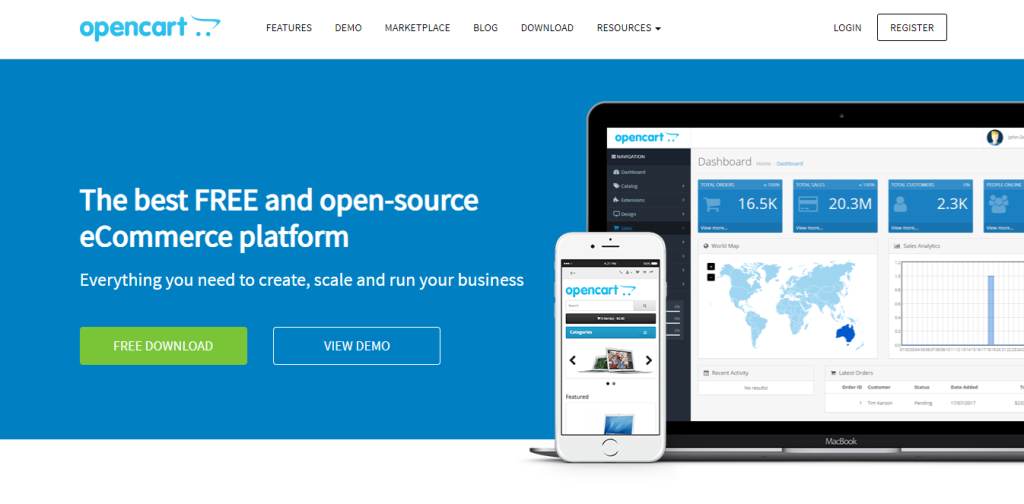
It is safe to say that OpenCart is one of the best open source ecommerce platforms for those who are just beginning with their ecommerce platform. Nonetheless, it is also to be noted that once the business expands, you may end up needing technical assistance to keep it going.
Benefits of Using OpenCart:
- Extremely user friendly
- Offers easy set up for beginners
- Offers sound inventory and lean management process flows
- Works better for on delivery payments mode
Drawbacks of Using OpenCart:
- Falls short in offering varied modes of payment options
- Limited SEO options available
- Limited customization options
- Offers only a small chunk of third party integrations
- Difficult to optimize in terms of SERP
Pricing:
Free
6. Prestashop
Prestashop is one of the emerging open source ecommerce platforms. It is also founded on PHP framework model using a web template system called Smarty.
Prestashop offers wide array of features. These include but are not limited to creating and customizing your online store, running your ecommerce website, growing your revenue, and most importantly going international.

According to Prestashop, there are more than about 300000 merchants on the marketplace offered and managed by them. The things that make this ecosystem stand out among other open source ecommerce platforms is the availability of a proactive helpful community that constantly help others in finding answers via forums and sharing their expertise.
Moreover, they have a robust team of developers that is constantly endeavoring to take this project ahead of competitors. The brand integrity of Prestashop can be identified with the fact that big names like Paypal, Google, Mailchimp, and Facebook are their clients.
Benefits of Using Prestashop:
- Offers countless modules and plugins for enhanced productivity
- Offers more than 3 thousand mobile supportive templates
- Ranks your ecommerce platform by using integrated SEO tools and techniques
- Offers multi currency options
- Offers convenient budget plans
Drawbacks of using Prestashop:
- Lacks in providing robust support
- Only good for beginners as technical assistance is almost always required as the business grows
- Does not support commonly used integrations and user need to rely on in house solutions only
Pricing:
The basic version of Joomla can be accessed for free. However, for managed services subscription, you are charged at $473 billed monthly.
7. Bagisto
Bagisto is also among the leading open source ecommerce platforms. It is also founded on PHP framework model using a web template system called Laravel.
Bagisto marks its standing since it is equally good for both beginners or startups and small to mid sized businesses.
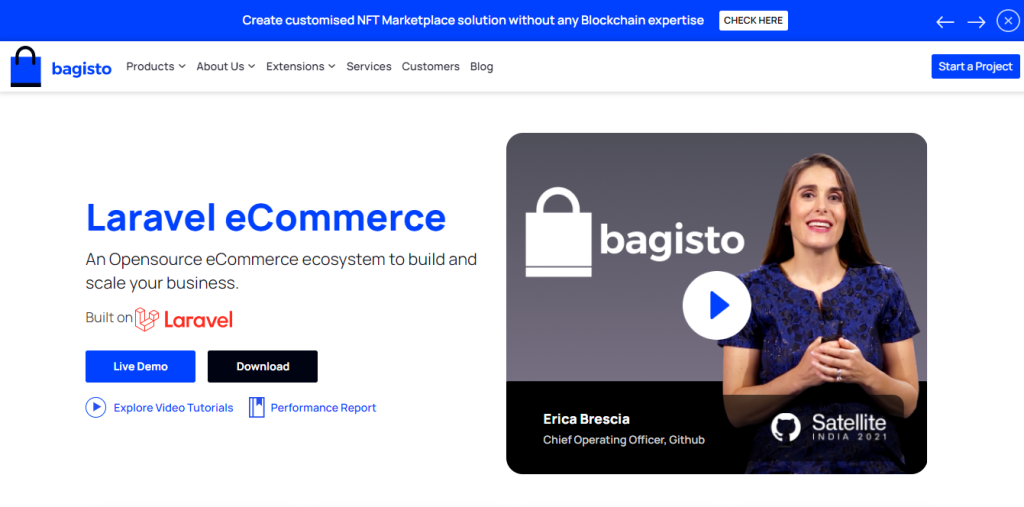
Bagisto is a multi tenant Saas provider meaning that its a single instance software that provides ground to serve multiple customers from different demographics.
With Bagisto, you can scale your online business and gain the advantage of high user engagement. It also excels in providing extensive support and maintenance services to its clients.
Besides offering different functionalities like strong SEO capabilities, inventory management, running your store on different ecommerce platforms, Bagisto stands out from other open source ecommerce platforms by incorporating different in built features that aim to provide a high quality user experience with the latest updates.
Benefits of Using Bagisto:
- Offers greater freedom of personalization and customization features
- Offers higher scalability by circumventing complicated coding requirements to users advantage
- Offers extensive range of plugins
- Varied payment methods
- Offers insights report
Drawbacks of Using Bagisto:
- Setting up of new modules on Bagisto can get tricky for beginners
- Limited community as compared to other big daddys like Woocommerce
- Looking for troubleshooting solutions from the community can be frustrating
Pricing:
Free
8. Yii2
Yii2 is regarded as a few of the most basic open source ecommerce platforms. It is built on PHP framework and is fast, secure and efficient in managing your ecommerce business. It offers reasonable default features that work amazingly for small and mid sized ecommerce platforms.
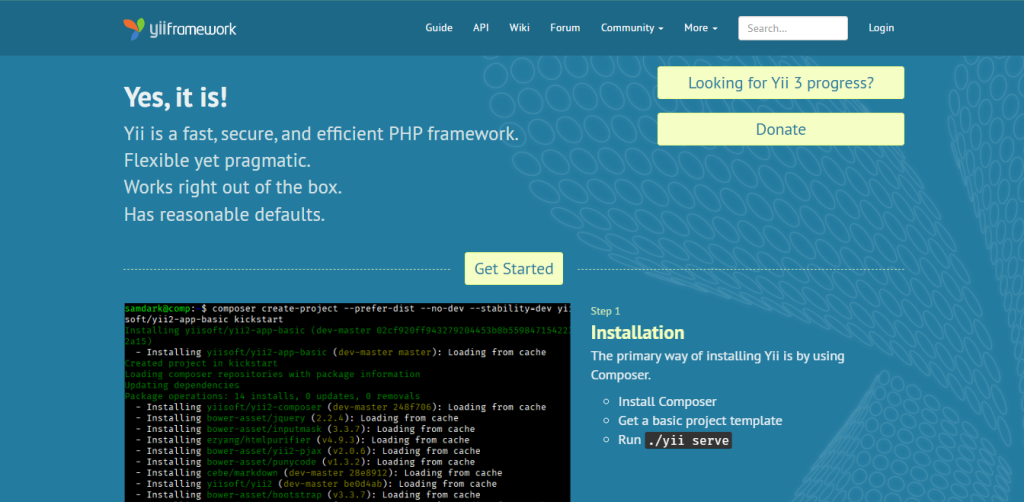
Although a considerable number of people running online businesses pick Yii2 to manage their website, it is to be noted that it is not a good choice for people who don’t know or like to code. The bottom line is you’ll most likely end up needing support of Yii2 development services in order to successfully launch your ecommerce business.
Benefits of Using Yii2:
- Offers easy ways to make changes to your ecommerce website
- A highly secured pick to earn and run online store
- Easy to adapt
Drawbacks of Using Yii2:
- Requires understanding of codes
- Lags in releasing updates
- Not recommended for beginners
- The community isn’t big enough in comparison to other open source ecommerce platforms
Pricing:
Free
9. Zencart:
Zencart was founded in 2003 and is relatively an old name among other open source ecommerce platforms. Zencart found its fame since it was designed with an intent to suffice the needs of those just getting started with the ecommerce business. Thereby, Zencart has made it very simple for users to set up and launch their first ecommerce store on the web.
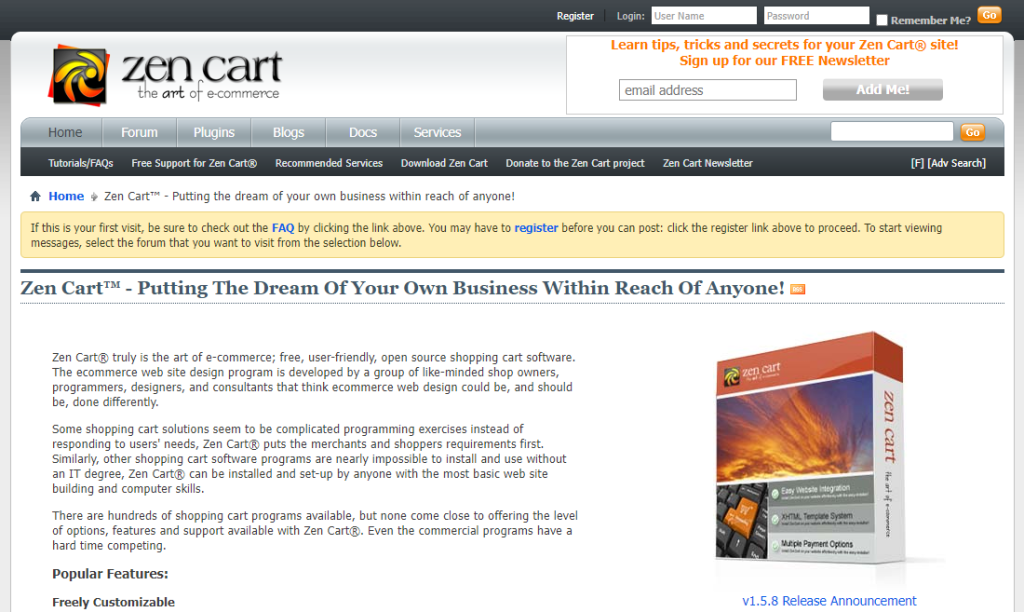
Although Zencart isn’t as popular as other big names because it doesn’t provide much customization and personalization features, it still hosts a community of over half and a million active members that make its standing among the good open source ecommerce platforms.
Benefits of Using Zencart:
- Good for starters
- Extremely simple set up process
- Convenient to manage your products and inventory
- Offers a wide array of free and premium themes and templates
Drawbacks of using Zencart:
- Offers only a limited freedom to customization and personalization features
- Built in themes aren’t appealing or catchy to users
- Limited functionality serves as a barrier to scale beyond a certain point
Pricing:
Zencart can be installed and downloaded for free. However, for added features and support, you may need to make a purchase of plugins which can be costly.
10. Craft Commerce
Craft commerce is a new name in the marketplace of open source ecommerce platforms. It was founded not too late in 2015 based on the PHP framework. Despite its age, builtwith reports that Craft Commerce successfully manages a good portfolio of about more than 4000 websites and handles their ecommerce processes and needs.
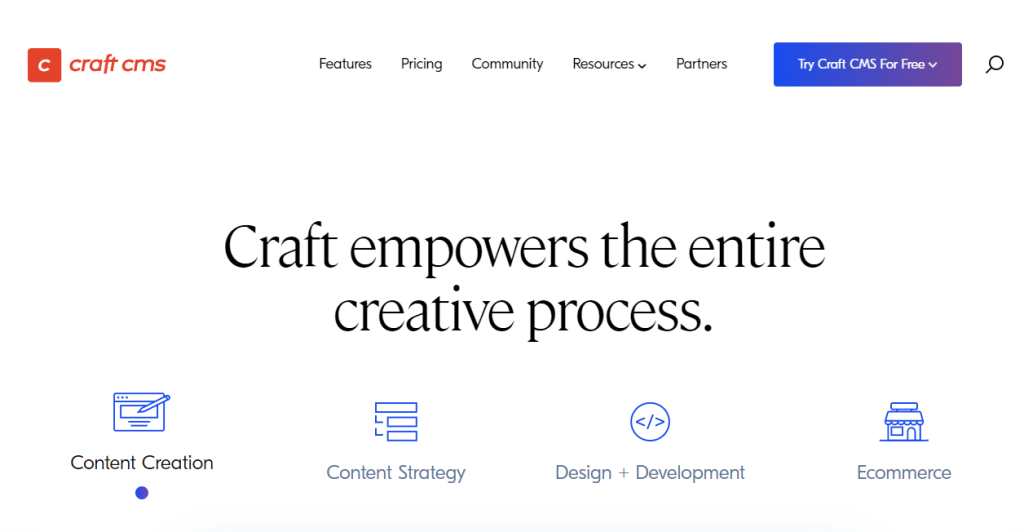
Regardless of the novelty of Craft Commerce, it is estimated that it will soon be a big competitor to other open source ecommerce platforms owing to the ease it provides to its end users.
Benefits of using Craft Commerce:
- Offers free basic version with vast features
- Recommended for designing interactive websites with greater customizations
- Supports third party SEO integrations that help in improving ranking of your ecommerce store
Drawbacks of Using Craft Commerce:
- Very small chunk of members in active community
- Although it offers profound customization, default themes are available in a very small number
- Premium subscription is costly
Pricing:
The solo version of Craft Commerce is available for free. However, the Pro module comes at $299 per project.

1 comment